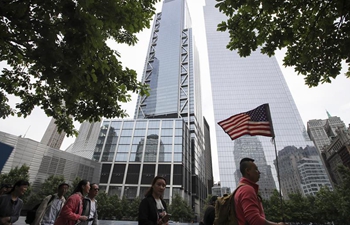LOS ANGELES, June 14 (Xinhua) -- Hawaii became the first U.S. state to completely ban the use of pesticides containing the potentially harmful chemical chlorpyrifos after Governor David Ige signed the bill Wednesday.
According to the bill that will fully take effect from 2023, starting Jan. 1 of 2019, users of pesticides containing chlorpyrifos or other pesticides with restricted use will be required to report annually to the state Department of Agriculture. Meanwhile, users will be prohibited from using the chemical within a 100-foot buffer zone around schools during school hours.
Before 2023 when the toxic pesticides will be completely banned, users will be prohibited from applying pesticides with chlorpyrifos without a temporary permit.
"We must protect our communities from potentially harmful chemicals." Ige told reporters, "We will work with the Department of Agriculture, local farmers and the University of Hawaii as we seek safe, alternative pest management tools that will support and sustain our agriculture industry for generations to come."
This move was hailed by Earth Justice, the largest nonprofit environmental law organization in the United States as "a major win for children and farmworker health in Hawaii."
Earth Justice also said Thursday: "Hawaii just did what Scott Pruitt's Environmental Protection Agency (EPA) refuses to do: protect public health by banning chlorpyrifos from our food and farms."
Prenatal exposure to chlorpyrifos is associated with lower birth weight, reduced IQ, loss of working memory, attention disorders, and delayed motor development, according to Earth Justice.
The EPA prohibited most household uses of Chlorpyfiros in residential areas in 2000 after it was found to cause severe developmental delays in children, and In 2015, the agency recommended that chlorpyrifos be banned from all food crops.
The Department of Agriculture has already restricted the use of chlorpyrifos since then in its proposed pesticides rule, and the use of the chemical has declined drastically.
However in March, the Trump administration opted to halt plans to completely ban the pesticide, rejecting conclusions reached by EPA scientists.













